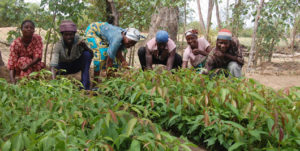Research reveals gender discrimination on productive farm lands
 A research conducted in the West Mamprusi District of the Northern Region has revealed that one of the major factors contributing to household food insecurity in the area is the prevention of smallholder women farmers to farm on productive lands.
A research conducted in the West Mamprusi District of the Northern Region has revealed that one of the major factors contributing to household food insecurity in the area is the prevention of smallholder women farmers to farm on productive lands.
The research findings which was made known at a sensitization forum organized at the Tikarinongu community in the District attracted various stakeholders including traditional authorities, opinion leaders, women and youth groups, local authorities among others.
The research conducted by the Tikarinongu Cooperative Farmers and Marketing Union at the Tikarinongu with funding support from the Business Sector Advocacy Challenge (BUSAC) Fund was aimed at addressing the challenges confronting smallholder rural women farmers in the White Volta basin in the West Mamprusi District.
The Tikarinongu Cooperative Farmers and Marketing Union is a predominant women group participating in various agribusiness activities.
The research said males control most of the fertile farmlands in the various communities.
It said the women only depended on marginal and infertile lands abandoned by their male counterparts for farming.
This, the research said, affected the size of smallholder rural women farmers’ farms and the variety of crops in the area leading to the food insecurity in many of the households in the community.
It said many of the smallholder rural women farmers in the area also lacked access to credit facilities, labour, tractor services as well as general agricultural advisory services such as agriculture extension services.
The research revealed that women in the communities were not considered in the decision-making process regarding inheritance of land more so other group members whose families do not have land at the river embankment cannot farm there.
It said advocacy and sensitization programmes are needed in the communities targeting traditional authorities, opinion leaders, local authorities, civil society organizations, women groups among others.
The research said this would ensure that smallholder rural women farmers gained access to productive lands as well as benefit from government’s agriculture policies and programmes on agriculture extension services, credit facilities and good record keeping.
Mr James Adocta Agandaa, the Financial Secretary of the Tikarinongu Cooperative Farmers and Marketing Union, said various studies have proven that many women farmers were doing well in all areas of mechanized agriculture where the land ownership is not determined by traditional customs and beliefs, and cited the Tono and Vea irrigation projects in the Upper East Region as examples.
The Financial Secretary said the study findings would be used to engage effectively with all stakeholders including the land owners, male farmer associations, chiefs and the Ministry of Food and Agriculture for the release of productive lands to the Tikarinungu Cooperative Farmers and Marketing Union members.
Mr Vincent Subbey, the Monitoring Officer of the BUSAC Fund, said the BUSAC Funded programmes seeks to build capacities of private sector organizations to identify, analyze and research into the business environment challenges.
Source: GNA
The post Research reveals gender discrimination on productive farm lands appeared first on Ghana Business News.
from Ghana Business News https://ift.tt/2Plhkha
via IFTTT
Comments
Post a Comment